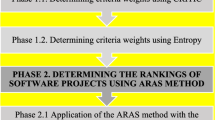Abstract
Six Sigma approaches aim at providing almost defect-free products and/or services to customers. Six Sigma is a powerful and comprehensive management tool for meeting customer needs. Well-designed projects are capable to provide significant financial benefits, bring competitive advantage and increased customer satisfaction.
Well-designed projects having clear and concise descriptions and objectives are capable to provide significant financial benefits, increased customer satisfaction and bring competitive advantage. Selecting Six Sigma improvement projects has been one of the most challenging and frequently discussed issues in the literature. Selecting the most useful project/s is a key success factor in Six Sigma approach. Selecting Six Sigma projects is a multi criteria decision making problem involving many tangible and intangible criteria under uncertainty. In this paper, uncertainty will be handled by neutrosophic sets. “A neutrosophic set deals with the origin, nature, and scope of neutralities, as well as their interactions with different ideational spectra” [1]. In neutrosophic sets, truth-membership, indeterminacy-membership and falsity-membership are all together included. Neutrosophic sets are accepted as a super set of the other types of sets such as classical sets, ordinary fuzzy sets, hesitant fuzzy sets, intuitionistic fuzzy sets, and soft sets.
In this paper, we employ interval neutrosophic TOPSIS method to evaluate Six Sigma projects. By reviewing the literature, seven criteria e.g. total cost, required time and customer satisfaction are taken into account. To the best knowledge of the authors, this is the first study to evaluate Six Sigma projects using interval neutrosophic TOPSIS approach with group decision making.
Access this chapter
Tax calculation will be finalised at checkout
Purchases are for personal use only
Similar content being viewed by others
References
Smarandache, F.: Neutrosophy/Neutrosophic Probability, Set, and Logic. Am. Res., Waltham (1998)
Peng, J.-J., Wang, J.-Q., Zhang, H.Y., Chen, X.-H.: An outranking approach for multi-criteria decision making problems with simplified neutrosophic sets. Appl. Soft Comput. 25, 336–346 (2014)
Peng, J.-J., Wang, J.Q., Wu, X.H., Wang, J., Chen, X.H.: Multi-valued neutrosophic sets and power aggregation operators with their applications in multi-criteria group decision-making problems. Int. J. Comput. Intell. Syst. 8(2), 345–363 (2015)
Tian, Z.-P., Zhang, H.-Y., Wang, J., Wang, J.Q., Chen, X.H.: Multi-criteria decision-making method based on a cross-entropy with interval neutrosophic sets. Int. J. Syst. Sci. 47(15), 3598–3608 (2015)
Bausys, R., Zavadskas, E.K., Kaklauskas, A.: Application of neutrosophic set to multicriteria decision making by COPRAS. Econ. Comput. Econ. Cybern. Stud. Res./Acad. Econ. Stud. 49(2), 1–15 (2015)
Liu, P., Zhang, L.: The extended VIKOR method for multiple criteria decision making problem based on neutrosophic hesitant fuzzy set. Gen. Math., 1–13 (2015)
Bausys, R., Zavadskas, E.K.: Multicriteria decision making approach by VIKOR under interval neutrosophic set environment. Econ. Comput. Econ. Cybern. Stud. Res./Acad. Econ. Stud. 49(4), 33–48 (2015)
Wang, Z., Liu, L.: Optimized PROMETHEE based on interval neutrosophic sets for new energy storage alternative selection. Rev. Téc. Ing. Univ. Zulia. 39(9), 69–77 (2016)
Zavadkas, E.K., Bausys, R., Stanujkic, D., Magdalinovic-Kalinovic, M.: Selection of lead-zinc flotation circuit design by applying WASPAS method with single-valued neutrosophic set. Acta Montanistica Slovaca 21(2), 85–92 (2016)
Tian, Z.-P., Wang, J., Wang, J.-Q., Zhang, H.-Y.: Simplified neutrosophic linguistic multi-criteria group decision-making approach to green product development. Group Decis. Negot. 26(3), 597–627 (2017)
Ye, J.: A multicriteria decision-making method using aggregation operators for simplified neutrosophic sets. J. Intell. Fuzzy Syst. 26, 2459–2466 (2014)
Broumi, S., Ye, J., Smarandache, F.: An extended TOPSIS method for multiple attribute decision making based on interval neutrosophic uncertain linguistic variables. Neutrosophic Sets Syst. 8, 2231 (2015)
Author information
Authors and Affiliations
Corresponding author
Editor information
Editors and Affiliations
Rights and permissions
Copyright information
© 2018 Springer International Publishing AG
About this paper
Cite this paper
Otay, İ., Kahraman, C. (2018). Six Sigma Project Selection Using Interval Neutrosophic TOPSIS. In: Kacprzyk, J., Szmidt, E., Zadrożny, S., Atanassov, K., Krawczak, M. (eds) Advances in Fuzzy Logic and Technology 2017. EUSFLAT IWIFSGN 2017 2017. Advances in Intelligent Systems and Computing, vol 643. Springer, Cham. https://doi.org/10.1007/978-3-319-66827-7_8
Download citation
DOI: https://doi.org/10.1007/978-3-319-66827-7_8
Published:
Publisher Name: Springer, Cham
Print ISBN: 978-3-319-66826-0
Online ISBN: 978-3-319-66827-7
eBook Packages: EngineeringEngineering (R0)




